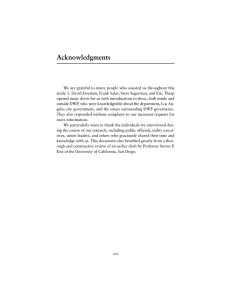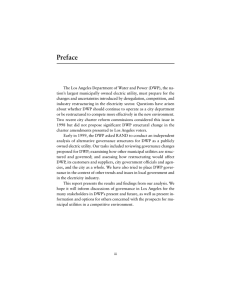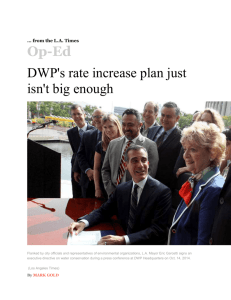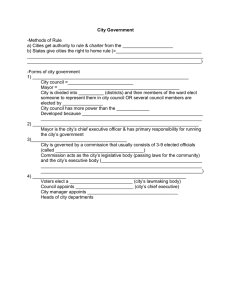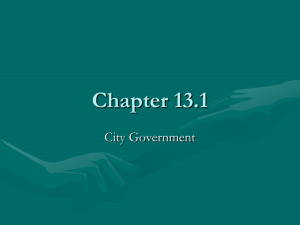Governance Options for DWP
advertisement
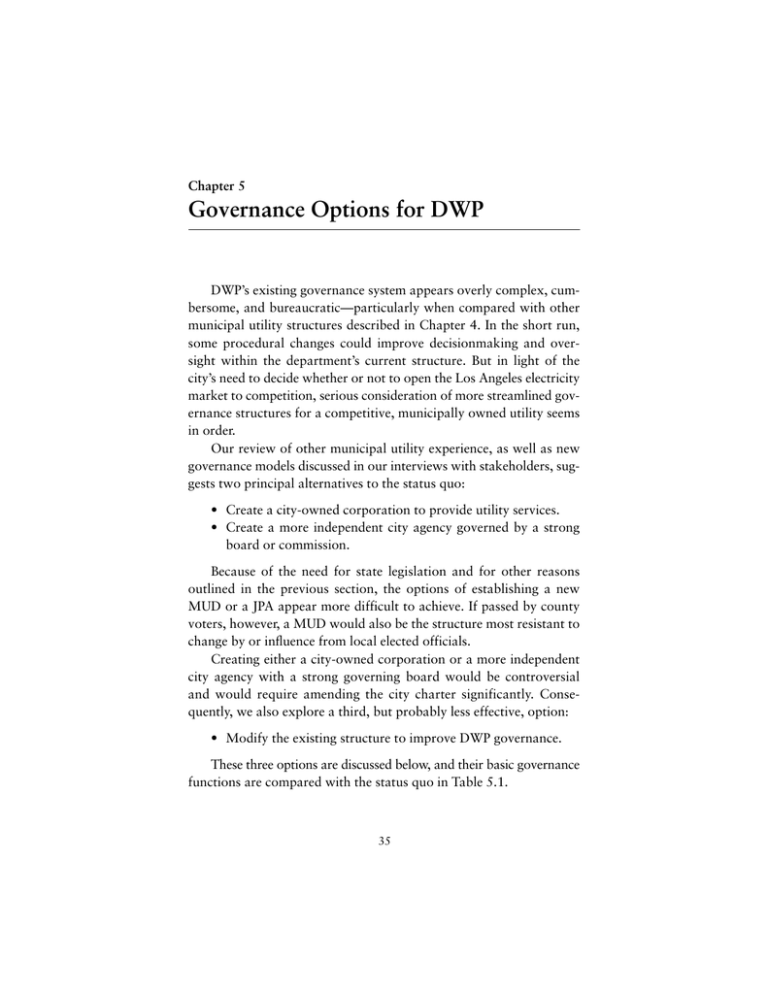
Chapter 5 Governance Options for DWP DWP’s existing governance system appears overly complex, cumbersome, and bureaucratic—particularly when compared with other municipal utility structures described in Chapter 4. In the short run, some procedural changes could improve decisionmaking and oversight within the department’s current structure. But in light of the city’s need to decide whether or not to open the Los Angeles electricity market to competition, serious consideration of more streamlined governance structures for a competitive, municipally owned utility seems in order. Our review of other municipal utility experience, as well as new governance models discussed in our interviews with stakeholders, suggests two principal alternatives to the status quo: • Create a city-owned corporation to provide utility services. • Create a more independent city agency governed by a strong board or commission. Because of the need for state legislation and for other reasons outlined in the previous section, the options of establishing a new MUD or a JPA appear more difficult to achieve. If passed by county voters, however, a MUD would also be the structure most resistant to change by or influence from local elected officials. Creating either a city-owned corporation or a more independent city agency with a strong governing board would be controversial and would require amending the city charter significantly. Consequently, we also explore a third, but probably less effective, option: • Modify the existing structure to improve DWP governance. These three options are discussed below, and their basic governance functions are compared with the status quo in Table 5.1. 35 36 GOVERNANCE IN A CHANGING MARKET Table 5.1 Governance Options for DWP Structure and Governance DWP Status Quo (New Charter) City-Owned Corporation Corporationa Structure City department Governing board term of office, selection, and removal Five-member commission; five-year, staggered terms Mayor appoints, council confirms Mayor may remove without council approval Board of directors, seven to nine members with staggered termsa General manager or CEO Board appoints with mayor and council approval Board may remove with mayor’s approval unless vetoed by two-thirds council vote Board appoints and may removea Other employee status Corporation operates Civil service except separate personnel for 16 exempt posisystema tions, requiring mayor’s approval unless vetoed by twothirds council vote Legal staffing Provided by city attorney; council also approves use of outside counsel Authorities retained by city council Approve rates Authorize new debt Approve joint capital projects Job classification and compensation Approve procurement >$150K Set customer contract guidelines Approve property sales/leases Can veto any board decision (Prop. 5) Strong Board or Commission Modified Status Quo Independent Agencya City department Seven to nine member Five-member comcommission with mission; five-year, staggered termsa staggered terms Mayor appoints, Mayor appoints, Mayor appoints, council confirms council confirms council confirms Mayor may remove Mayor may remove Mayor may remove with two-thirds coun- with council majority with two-thirds coun- cil approvala approvala cil approvala Board appoints and may removea Same as status quo Agency operates separate personnel system under general oversight of councila Same as status quo, but with more delegation to DWP management and commission Board appoints legal advisora Board appoints legal advisora Board appoints legal advisor with city attorney and council approvala Approve rates Authorize new debt Represent city as sole shareholder, but no Prop. 5 veto powera Approve rates Authorize new debt General policy oversight of board and agency, but no Prop. 5 veto powera Same as status quo, but with more forbearance and delegation to DWP management and commission Open board meetings Open board meetings Open board meetings Other limits on board CAO approves under Brown Act authority under Brown Act agenda items (ED39) under Brown Act Open board meetings under Brown Act Payments to city 5% of operating revenue a Requires city charter amendment. 5% of operating revenue 5% of operating revenue 5% of operating revenue GOVERNANCE OPTIONS FOR DWP 37 Option 1: A City-Owned Corporation to Provide Utility Services Forming a city-owned corporation, with a strong board of directors removed from day-to-day city politics, would give DWP much greater flexibility, encourage operating efficiencies, and enable the utility to respond more quickly to the marketplace. The recent incorporation of Toronto’s municipal utility shows that this is a realistic alternative if desired by Los Angeles elected officials and voters. Under this option, voters would be asked to approve city charter amendments that would transfer DWP’s assets and operations to a newly formed California nonprofit corporation,38 governed by a board of directors with the city as sole shareholder. For clarity, we describe here a specific governance structure, but the corporate form is very flexible and would permit a variety of other implementations. The corporation’s board of directors would have authority to hire and fire a general manager or CEO—to whom it would delegate dayto-day decisions—as well as a chief legal advisor. The board would be responsible for overseeing all of the utility’s operations except for those expressly reserved to the mayor, council, or other city officials. The council would retain its power to approve rates, authorize new debt, and generally represent the city as sole shareholder. However, it would not have Prop. 5 veto power over board decisions. Political accountability of the utility to the city’s elected officials would primarily reside in the power of the mayor and council to appoint and remove directors. The most straightforward approach is for the mayor to appoint and the council to confirm all directors, although dividing appointments between mayor and council or other variations would be feasible.39 Terms would be staggered, and removal of a director by the mayor would require a supermajority vote of the council. We would recommend expanding the board to at least seven and up to nine members to be representative of the city and encompass the business, financial, and other skills required to oversee the utility’s management and operations. However, we do not recommend earmarking board seats for specific qualifications or constituencies. Unless specifically restricted by charter or ordinance, a city-owned corporation would have more flexibility than a city agency to attract 38 GOVERNANCE IN A CHANGING MARKET managers and skilled professionals, offer financial incentives for performance, negotiate with customers and suppliers, and operate in a businesslike fashion. It would use generally accepted accounting principles (GAAP) and file financial reports, as other corporate utilities do. Corporatization would enable Los Angeles’s municipal utility to compete most effectively head-to-head with investor-owned utilities and other private corporations while retaining the benefits of public ownership (Poole, 1998). This option would require voter approval of several amendments to the city charter as well as the necessary implementing ordinances. The charter amendments could include a provision to maintain utility payments to the city’s general fund at 5 percent of operating revenue, unless limited by bond covenants or other charter provisions. And to dampen concern that corporatization might inexorably lead to privatization, the charter could require voter approval for any change in the city’s 100 percent ownership of the utility. Option 2: An Independent City Agency with a Strong Governing Board DWP could operate more flexibly and efficiently as a city agency if it had a single, strong governing board or commission that was more insulated from day-to-day politics but still responsive to public concerns. This was basically the model for the Board of Water and Power Commissioners in the 1925 City Charter. Although the strong commission model no longer exists in Los Angeles (as discussed in Chapter 2), it works well for the municipal utilities in Jacksonville and Knoxville. Governance would be similar to that described above for a cityowned corporation. We would recommend expanding the current commission to seven to nine members who would be appointed by the mayor and confirmed by the council, or appointments could be divided between mayor and council.40 To provide board continuity and independence, members would serve staggered terms and have some protection against arbitrary removal. In Jacksonville, for example, the mayor’s removal of a board member requires council approval by a GOVERNANCE OPTIONS FOR DWP 39 two-thirds vote. As in Option 1, the charter would not specify qualifications for individual commissioners, but the commission as a whole should be broadly representative of the city and have the requisite experience and skills to oversee the utility.41 The commission would have full authority to appoint and remove a general manager. Under broad general policies set out by the mayor and council, the commission would be responsible for specific policy for and oversight of all aspects of the utility’s normal operations. The commission would delegate day-to-day management decisions to the general manager, subject to board oversight. The council would retain its authority to approve rates, authorize new debt, and provide general policy guidance to the commission, but it would not have Prop. 5 veto power over commission decisions. On personnel matters, we recommend giving the commission as much flexibility and autonomy as is practically possible.42 This option would also require voter approval of several amendments to the city charter as well as the necessary implementing ordinances. The charter amendments could again include a provision to maintain utility payments to the city’s general fund at 5 percent of operating revenue, unless limited by bond covenants or other charter provisions. Option 3: Modifications of the Existing Structure to Improve DWP Governance Although the currently divided authorities among mayor, council, and commission are cumbersome and often conflicting, governance and decisonmaking could be improved somewhat within DWP’s existing structure. The goals would be to focus governance on policy issues, limit political involvement in routine business matters, and streamline approval processes. The changes listed below would not advance these goals as effectively as restructuring under the first two options. However, with two exceptions as noted below, they would not require new charter amendments or other major structural changes. 40 GOVERNANCE IN A CHANGING MARKET Expect DWP Commissioners to Serve Full Five-Year Terms In a more competitive environment, DWP needs knowledgeable and experienced commissioners who can make decisions primarily based on their independent judgment. The commission must remain politically responsible to the mayor and council, but it should be insulated from undue political influences on normal DWP business matters. Under both the old and new charters, commissioners are appointed to five-year, staggered terms by the mayor and are confirmed by the council. It is a fiction however, that they serve out their full terms—unless the current mayor wants them to. The mayor can remove commissioners at any time under the new charter. And although not required to do so under the charter, commissioners by custom offer their resignations after a mayoral election so that a new mayor can appoint his or her own commission. To maintain independence and continuity, DWP commissioners could be expected to serve out their terms unless there is cause for their removal. They would not resign when a new mayor is elected.43 The appropriate model is the Ethics Commission, whose members can be removed by the mayor only with council approval or for cause by a two-thirds vote of the council.44 This change would require a charter amendment. Enable DWP to Hire a Legal Advisor and Staff An enterprise as large and complex as DWP needs a chief legal advisor who is directly responsible to the board and general manager. DWP also needs attorneys with specialized knowledge of water, power, and environmental law. The current system, in which the city attorney’s office provides legal services to the department, handles many routine matters satisfactorily but does not provide the rapid response and full range of expertise that DWP requires. The Board of Water and Power Commissioners could be authorized to appoint a chief legal advisor who will report to the general manager and the board. If the current departmental structure is retained, having the city attorney and/or the council approve this appointment may be necessary and appropriate. The legal advisor should GOVERNANCE OPTIONS FOR DWP 41 be able to hire a small staff and retain outside counsel using the department’s funds. This change would require a charter amendment. Eliminate Formal CAO Review of Commission Agenda Items While citywide coordination of the departments is an important function of the mayor’s office, the current use of ED39 to control commission agendas seems heavy-handed. In DWP’s case, requiring formal CAO review and approval of individual agenda items under ED39 results, for the most part, in unnecessary paperwork and delay. Coordination can surely be handled less bureaucratically. The mayor’s staff assigned to monitor each commission can readily obtain the agenda before a commission meeting. If the mayor’s office has a problem with an agenda item, staff can request that the item be continued or removed from the agenda. Regular, informal consultation with the mayor’s office rather than formal ED39 review would speed up and, we believe, improve the decisionmaking processes of the Water and Power Commission. This change can be made by the mayor. It does not require council or voter approval. Eliminate Council Oversight of DWP Routine Business Matters Even though the existing structure mandates council oversight of DWP operations, a more competitive environment will demand more delegation of authority and some forbearance. Specific steps for the council to consider include giving DWP management more flexibility to • make larger procurement awards (up to $500,000 or $1 million); • negotiate long-term customer contracts within a broader range; • sell or transfer surplus real property; • expedite hiring of technical and marketing employees; and • exercise greater autonomy in other personnel matters. Most important, the council can forbear using its review and veto powers under Prop. 5 for oversight of DWP contracting and other business decisions. Whatever the outcome of council reconsideration, Prop. 5 42 GOVERNANCE IN A CHANGING MARKET has a chilling effect on DWP management and commission decisions. The threat of Prop. 5 veto fosters bureaucratic delay, takes up scarce management time, encourages more paperwork to justify decisions and adds uncertainty to normal business dealings. The impacts appear to be significant and inimical to doing business in the private world. These changes can be implemented by the council.45 Discussion: Rationale for and Objections to Restructuring All three options discussed above maintain the primary public benefits of a municipal utility: • Local ownership. • Local rate setting authority. • Tax-exempt financing and preferences in purchasing federal power. • Exemption from most income, property, and business taxes. • Sensitivity to local economic development, the environment, and other social goals. • Commitment to make direct transfers to the city’s general fund. Each option also keeps the utility’s governing board accountable to city elected officials. The corporatization and independent city agency options would go furthest in helping DWP become more efficient, businesslike, and responsive to changing market conditions. However, these options require substantial changes from the status quo to invest primary governance responsibility in a single board. Restructuring would give the new board considerably more authority to oversee the utility and would deliberately distance the board and utility from day-to-day oversight by the mayor and council.46 A variety of objections to such restructuring were raised during our interviews. Some people believe that, after downsizing and with its debt-reduction programs, DWP operates well enough today. Despite divided governance and relatively long decision processes, they argue, DWP’s advantages of low-cost debt and exemption from income and GOVERNANCE OPTIONS FOR DWP 43 property taxes will enable it to compete effectively for the foreseeable future. Because the system works adequately (if creakily) now, it does not need to be fixed. Others contend that many of the governance problems DWP perceives are exacerbated, if not caused, by poor staff work and inadequate communication between the department and the mayor’s office, CAO, CLA, and council. Some in city government believe that DWP does not “work the system” nearly as well as it could and should. Moreover, they say, DWP does not have the internal competence in finance, personnel, and other areas to function as an independent entity. A third recurring theme is that the current governance system maintains the checks and balances needed to ensure that DWP serves overall city objectives. The department’s mission is to supply water and power services reliably and at low cost, but it also provides other public benefits, such as supporting community activities, requiring contractors to comply with the city’s Living Wage Ordinance, and giving other city departments first crack at surplus properties. At the request of elected city officials, DWP also helps fund other public projects. Close oversight by the mayor’s office and council thus is necessary to see that such broad, citywide objectives are achieved. A variation on this theme states that public agencies must be held to higher ethical standards than are private enterprises, which again requires close accountability to elected officials and their staffs. Finally, some argue that giving DWP and its board more autonomy would set a poor precedent and encourage other departments and commissions to seek independence from the mayor and council. If the Water and Power Commission were freed from ED39 and Prop. 5 review, what would prevent the Airport and Harbor Commissions, and indeed all city commissions, from receiving the same exemptions? According to this argument, changing DWP’s governance structure would inevitably lead to agency balkanization and the loss of citywide coordination by the mayor and council. Some of these points can be discussed in concrete terms—e.g., what additional internal financial staff capacity would DWP need to operate as a corporation? But others raise a more fundamental issue about the rationale for public utility ownership in Los Angeles. Should 44 GOVERNANCE IN A CHANGING MARKET DWP be run as a public business, emphasizing reliable service, low consumer rates, and cash transfers to the city, while still providing local economic development and environmental leadership, or should it also serve broader social and political agendas? The current governance system tries to meld these two philosophies, and it has successfully done so with DWP as a monopoly provider. In a competitive environment, however, the two goals will increasingly clash, and the city might not be able to satisfy both.
